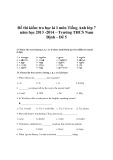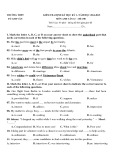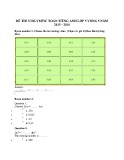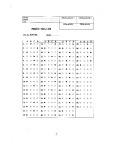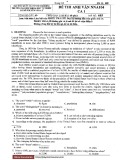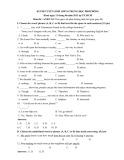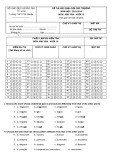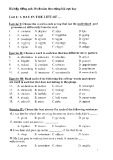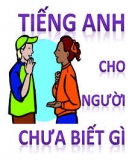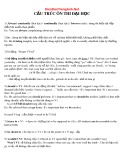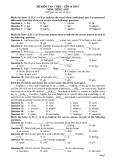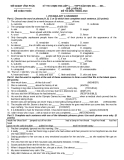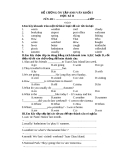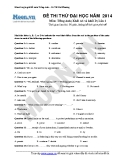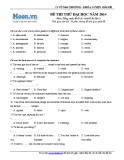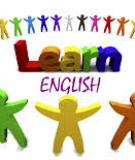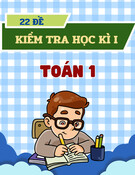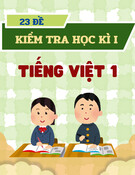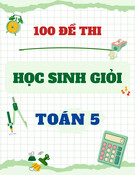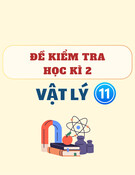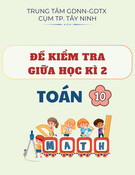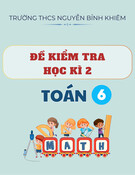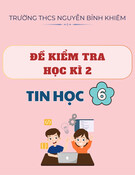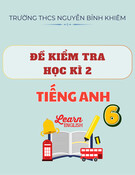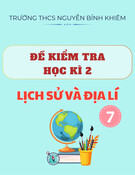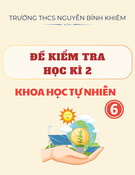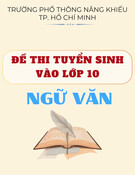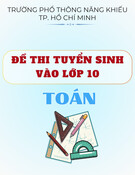Cơ sở BDVH & LTĐH Quỳnh Phát – 232 Trần Thủ Độ, P.Phú Thạnh, Q.Tân Phú –ĐT: 08.3978.7812
ĐỀ THI THỬ TUYỂN SINH ĐẠI HỌC NĂM 2014 Môn: TIẾNG ANH; Khối D & A1 (LẦN 02) Thời gian làm bài: 90 phút, không kể thời gian phát đề
C. persuade C. practicing C. external Mark the letter A, B, C, or D on your answer sheet to indicate the word that differs from the rest in the position of the main stress in each of the following questions. B. surpass B. obstacle B. fabulous B. correspond D. exchange D. supporter D. slippery D. passenger D. inattentive C. minimum C. encouraging Question 1: A. profile Question 2: A. preference Question 3: A. delegate Question 4: A. orient Question 5: A. untrustworthy B. diversity Mark the letter A, B, C, or D on your answer sheet to indicate the correct answer to each of the following questions. Question 6: How well people remember things ____ on many different factors. A. depends B. depended C. depending D. depend Question 7: No charge will be made if you cancel within 10 days. But cancellations ____ in writing. A. will make B. must be made C. must make D. can make Question 8: Scientists agree that the world's climate ____ warmer over the past 50 years, but they disagree about the causes. A. is becoming B. becomes C. became D. has become Question 9: You ____ concern yourself with the program. The organizers of the festival will take care of it. A. mustn't B. needn't C. may not D. might not Question 10: To end or greatly reduce pollution ____, people would have to stop using many things that benefit
them. A. constantly B. suddenly C. immediately D. directly
B. in for C. away A. on D. through
Question 11: Ben went ________ the competition and won the first prize. Question 12: The last of these reasons is ____ the most important. B. very A. so C. far D. by far Question 13: _________ I ask Martha for a date and she laughs at me? A. What should B. What if C. What would D. As if Question 14: "You should concentrate on ___ the teacher is saying." A. what B. which C. that D. whom Question 15: ____ we arrived at the hotel when there was a power cut. A. Not only had B. Hardly had C. No sooner had D. Little had Question 16: The temperatures ____ take place vary widely for different materials.
A. at which they melt and freeze C. which they melt and freeze B. which melting and freezing D. at which melting and freezing Question 17: My father supposes, ____ , that he will be retiring at 60.
A. like most people did C. as do most people B. like most people do D. as most of people
A. got by on C. got on well with B. got into a mess D. got away from
B. keep in touch with C. keep quiet D. bring up A. keep an eye on Question 18: He spent too much money and _____________ with his credit card payments. Question 19: She asked Mark to __________ the children while she went to the shops. Question 20: __________Ann by phone, James decided to email her.
A. Having failed to contact C. He failed to contact B. Having failed contacting D. That he failed contacting. Question 21: Tim looks so frightened and upset. He ____________something terrible.
1
A. must experience C. can have experienced B. should have experienced D. must have experienced Question 22: If you're too ___ , other people will take advantage of you.
Bộ đề luyện thi đại học 2014- GV: Lê Thạnh: 0913.749.445
Cơ sở BDVH & LTĐH Quỳnh Phát – 232 Trần Thủ Độ, P.Phú Thạnh, Q.Tân Phú –ĐT: 08.3978.7812
A. trusting B. trustworthy C. trusted D. untrustworthy
Question 23: I think the _____ thing would be to take a taxi home. I'm tired of walking. A. sensitive B. sensational C. sensible D. senseless Question 24: You'd better cut ____ animal fat if you want to lower your cholesterol level. A. out in B. down with C. off with D. down on Question 25: “I can’t remember us ever _______, “ replied the stranger. A. being met B. to have met C. having met D. to meet
Question 26: I expect the new trend will soon ____ here. B. catch up A. take up C. catch on D. identify with Question 27: The Continental United States is ________ that there are four time zones. A. so a big area B. very big C. much big D. so big an area Question 28: In my view the changes to the education system have been to good ____ A. outcome B. upshot C. influence D. effect
Question 29: - "I left work early today, dear." A. Why was that C. How's that? B. Why did you leave D. When so
Question 30: - "Wait! I have something to do before we can go to the play." - "____! We don't have much time, honey." A. Leave immediately B. Come on C. Come at once D. No way
Mark the letter A, B, C, or D on your answer sheet to indicate the word/phrase that is closest in meaning to the underlined part. Question 31: In 1985, the Coca-Cola Company altered the secret formula of the drink's ingredients. B. proposed A. modified C. enriched
B. first-year students D. young professors
D. restored Question 32: In my experience, freshmen today are different from those I knew, 2 years ago. A. new counselors C. new students Question 33: To prepare for a job interview, you should jot down your qualifications, work experience as well as some important information about yourself. A. what you have experienced C. your own qualities in real life B. your bio data and special qualities D. what you have earned through study
Mark the letter A, B, C, or D on your answer sheet to indicate the word or phrase that is OPPOSITE in meaning to the underlined part in each of the following questions.
Question 34: The relationship between structure, process and outcome is very unclear. B. external A. disappear C. apparent D. obvious Question 35: The situation in the country has remained relatively stable for a few months now. A. constant B. changeable C. objective D. ignorant
Read the following passage and mark the letter A, B, C, or D on your answer sheet to indicate the correct word for each of the blanks. No one can say when sports began. Since it is impossible to (36) ____ a time when children did not
2
spontaneously run races or wrestle, it is clear that children have always included sports in their play, but one can only speculate about the (37) ____ of sports as autotelic physical contests for (38) ____. Hunters are depicted in prehistoric art, but it cannot be known (39) ____ the hunters pursued their prey in a mood of grim necessity or with the joyful abandon of sportsmen. It is certain, (40) _____, from the rich literary and iconographic evidence of all ancient civilizations that hunting soon became an end in itself at least for royalty and nobility. Archaeological evidence also indicates that ball games were common among ancient peoples as (41) ____ as the Chinese and the Aztecs. If ball games were contests rather than (42) ____ ritual performances, such as the Japanese football game kemari, then they were sports in the most rigorously (43) ____ sense. That it cannot (44) ____ be assumed that they were contests is clear from the evidence presented by Greek and Roman antiquity, which indicates that ball games had been for the most part playful pastimes (45) _____ those recommended for health by the Greek physician Galen in the 2nd century AD.
Bộ đề luyện thi đại học 2014- GV: Lê Thạnh: 0913.749.445
Cơ sở BDVH & LTĐH Quỳnh Phát – 232 Trần Thủ Độ, P.Phú Thạnh, Q.Tân Phú –ĐT: 08.3978.7812
D. imagine D. mersion D. society D. why
D. old
B. see B. emerge B. children B. whether B. so B. far B.competitively B. defined C. have C. Emergency C. aldult C. how C. consequently D. however C. similar C. noncompetitive C. definitive C.usually C. alike D. competition D. definition D. simply D.of Question 36: A. think Question 37: A. emergence Question 38: A. people Question 39: A. when Question 40: A. therefore Question 41: A. different Question 42: A. competitive Question 43: A. definite Question 44: A. really B. actually Question 45: A. as B. like
Read the following passage and mark the letter A, B, C, or D on your answer sheet to indicate the correct answer to each of the questions.
Etymologically, anthropology is the science of humans. In fact, however, it is only one of the sciences of humans, bringing together those disciplines the common aims of which are to describe human beings and explain them on the basis of the biological and cultural characteristics of the populations among which they are distributed and to emphasize, through time, the differences and variations of these populations. The concept of race, on the one hand, and that of culture, on the other, have received special attention; and although their meaning is still subject to debate, these terms are doubtless the most common of those in the anthropologist's vocabulary.
Anthropology, which is concerned with the study of human differences, was born after the Age of Discovery had opened up societies that had remained outside the technological civilization of the modern West. In fact, the field of research was at first restricted to those societies that had been given one unsatisfactory label after another, "savage," "primitive," "tribal," "traditional," or even "preliterate," "prehistorical," and so on. What such societies had in common, above all, was being the most "different" or the most foreign to the anthropologist; and in the early phases of anthropology, the anthropologists were always European or North American. The distance between the researcher and the object of his study has been a characteristic of anthropological research; it has been said of the anthropologist that he was the "astronomer of the sciences of man."
Anthropologists today study more than just primitive societies. Their research extends not only to village communities within modern societies but also to cities, even to industrial enterprises. Nevertheless, anthropology's first field of research, and the one that perhaps remains the most important, shaped its specific point of view with regard to the other sciences of man and defined its theme. If, in particular, it is concerned with generalizing about patterns of human behaviour seen in all their dimensions and with achieving a total description of social and cultural phenomena, this is because anthropology has observed small-scale societies, which are simpler or at least more homogeneous than modern societies and which change at a slower pace. Thus they are easier to see whole.
What has just been said refers especially to the branch of anthropology concerned with the cultural characteristics of man? Anthropology has, in fact, gradually divided itself into two major spheres, the study of man's biological characteristics and the study of his cultural characteristics. The reasons for this split are manifold, one being the rejection of the initial mistakes regarding correlations between race and culture. More generally speaking, the vast field of 19th century anthropology was subdivided into a series of increasingly specialized disciplines, using their own methods and techniques, that were given different labels according to national traditions. Question 46: According to the passage, anthropology is most likely defined as the study of____.
A. one of the sciences of humans B. the biological and cultural characteristics of human beings C. the lives of peoples all over the world D. the distribution of human beings the world over Question 47: Which of the following is NOT stated in the passage?
3
A. Anthropology has been subdivided into specialized disciplines B. Anthropology gives special attention to the concept of race. C. Anthropology is concerned with the study of human differences. D. Anthropologists are agreed on the meaning of race and culture. Question 48: It is implied in the passage that the early anthropologists did research only on _____. B. modern groups A. large societies C. racial minorities D. civilized societies
Bộ đề luyện thi đại học 2014- GV: Lê Thạnh: 0913.749.445
Cơ sở BDVH & LTĐH Quỳnh Phát – 232 Trần Thủ Độ, P.Phú Thạnh, Q.Tân Phú –ĐT: 08.3978.7812
Question 49: It can be inferred from the passage that anthropology was first developed in _____.
A. Europe and North America B. some primitive societies C. some tribal societies D. some prehistoric societies Question 50: Anthropologists of the early phases were regarded as the "astronomers of the sciences of man" because ____.
A. they also studied the sun, moon, stars, planets, etc. B. they also studied our planets as the sciences of man C. they did not belong to the societies into which the did research D. they applied the sciences of man to astronomy Question 51: According to the passage, modern anthropologists study _____. B. both communities and modern societies A. only primitive and tribal societies C. only modern industrial enterprises D. both primitive and modern societies Question 52: The phrase "first field of research" in paragraph 3 most likely refers to
the study of ____. A. modern societies B. primitive societies C. large societies D. industrial societies Question 53: Small societies are preferable to anthropological research because they are____.
A. simple, homogeneous, and change slowly C. ancient, exotic, and interesting B. small, isolated, and easy to study D. similar to primitive societies Question 54: It is mentioned in the passage that the split of anthropology into two major areas is partly due to
____. A. more knowledge to be gained B. the development of the sciences of humans C. the interpretation of race and culture D. the development of modern anthropology Question 55: It is mentioned in the passage that anthropology began to divide into various disciplines in _____.
A. prehistoric times C. the 20th century B. the Age of Discovery D. the 19th century
Read the following extract from Encyclopedia Britannica and mark the letter A, B, C, or D on your answer sheet to indicate the correct answer to each of the questions.
It may seem as if the art of music by its nature would not lend itself to the exploration and expression of reality characteristic of Romanticism, but that is not so. True, music does not tell stories or paint pictures, but it stirs feelings and evokes moods, through both of which various kinds of reality can be suggested or expressed. It was in the rationalist 18th century that musicians rather mechanically attempted to reproduce stories and subjects in sound. These literal renderings naturally failed, and the Romanticists profited from the error. Their discovery of new realms of experience proved communicable in the first place because they were in touch with the spirit of renovation, particularly through poetry. What Goethe meant to Beethoven and Berlioz and what German folk tales and contemporary lyricists meant to Weber, Schumann, and Schubert are familiar to all who are acquainted with the music of these men. There is, of course, no way to demonstrate that Beethoven's Egmont music or, indeed, its overture alone
corresponds to Goethe's drama and thereby enlarges the hearer's consciousness of it; but it cannot be an accident or an aberration that the greatest composers of the period employed the resources of their art for the creation of works expressly related to such lyrical and dramatic subjects. Similarly, the love of nature stirred Beethoven, Weber, and Berlioz, and here too the correspondence is feltj and persuades the fit listener that his own experience is being expanded. The words of-the creators themselves record this new comprehensiveness. Beethoven referred to his activity of mingled contemplation and composition as dichten, making a poem; and Berlioz tells in his Memoires of the impetus given to his genius by the music of Beethoven and Weber, by the poetry of Goethe and Shakespeare, and not least by the spectacle of nature. Nor did the public that ultimately understood their works gainsay their claims. It must be added that the Romantic musicians including Chopin, Mendelssohn, Glinka, and Liszt-had at their disposal
4
greatly improved instruments. The beginning' of the 19th century produced the modern piano, of greater range and dynamics than theretofore, and made all wind instruments more exact and powerful by the use of keys and valves. The modern full orchestra was the result. Berlioz, whose classic treatise on instrumentation and orchestration helped to give it definitive form, was also the first to exploit its resources to the full, in the Symphonic fantastique of 1830. This work, besides its technical significance just mentioned, can also be regarded as uniting the characteristics of Romanticism in music, it is both lyrical and dramatic, and, although it makes use of a “story,” that use is not to describe the scenes but to
Bộ đề luyện thi đại học 2014- GV: Lê Thạnh: 0913.749.445
Cơ sở BDVH & LTĐH Quỳnh Phát – 232 Trần Thủ Độ, P.Phú Thạnh, Q.Tân Phú –ĐT: 08.3978.7812
connect them; its slow movement is a "nature poem" in the Beethovenian manner; the second, fourth, and fifth movements include "realistic" detail of the most vivid kind; and the opening one is an introspective reverie. Question 56: Music can suggest or express various kinds of reality by ____. B. stirring feelings and evoking moods A. telling stories or minting pictures C. exploring and expressing reality D. depicting nature and reality Question 57: The word "error" in paragraph 1 refers to _____.
A. the feelings and moods of the Romanticist musicians B. the exploration and expression of reality of Romanticism C. the works of the Romanticist musicians in the 18th century D. musicians'mechanical reproduction of stories and subjects
Question 58: It is stated in the passage that the Romanticists were influenced by _____. A. the works of the rationalist musicians in the 18th century B. Goethe, German folk tales and contemporary lyricists C. the thoughts of Beethoven, Weber, and Berlioz D. the art of music by the rationalist musicians Question 59: The word "accident" in paragraph 2 is closest in meaning to ____.
A. unplanned happening C. unusual occurrence B. collision or similar incident D. unpleasant event Question 60: The passage indicates that the Romanticist composers were inspired not only by lyrical and dramatic
subjects but also by ____. A. the rationalists B. the creation of works C. the love of nature D. the poetry of Goethe Question 61: It can be inferred from the passage that Berlioz was ____.
A. a rationalist musician C. a composer and critic B. an English writer D. a German poet
Question 62: The Romantic musicians also made use of modern technologies such as B. powerful keys and valves A. improved wind instruments D. instrumentation and orchestration C. greater range and dynamics Question 63: Romanticism in music is characterized as being ____.
A. exact and powerful C. great and dynamic B. realistic and vivid D. lyrical and dramatic Question 64: All of the following are true about the Symphonic fantastique EXCEPT
A. It is both lyrical and dramatic. C. It was issued in 1830. B. It was composed by Beethoven. D. It unites the characteristics of Romanticism.
A. the 18th and 19th centuries C. the early 19th century Question 65: According to the passage, Romanticism in music extended over ____. B. the late 18th century D. the beginning of the 20th century Mark the letter A, B, C, or D on your answer sheet to show the underlined part that needs correction. Question 66: We did a quick count of the children on the bus and there were no missing. A B C D
Question 67: Under the terms of the contract the job would have been finished yesterday. B C D A Question 68: Alike other forms of energy, natural gas may be used to heat homes, cook food and even run machines. A B C D
Question 69: They had an arrangement that the children will spend two weeks with each parent. A B C D Question 70: I asked him whether he had done it all himself or someone had helped him. A B C D
Mark the letter A, B, C, or D on your answer sheet to indicate the sentence that is closest in meaning to each of the following questions. Question 71: "I wouldn't apply for that job, Lan, if I were you," said Minh.
5
A. Minh advised Lan not to apply for that job. B. Minh recommended Lan not to apply for that job.
Bộ đề luyện thi đại học 2014- GV: Lê Thạnh: 0913.749.445
Cơ sở BDVH & LTĐH Quỳnh Phát – 232 Trần Thủ Độ, P.Phú Thạnh, Q.Tân Phú –ĐT: 08.3978.7812
C. Minh felt sorry because Lan applied for that job. D. Minh apologized to Lan for applying for that job. Question 72: No one has ever seen the old man again since then.
A. The old man has not been seen again by anyone since then. B. The old man has never seen anyone since then. C. The old man was not seen by anyone since then. D. The old man has never been seen again since then. Question 73: She was still bad at English although she put much effort into it.
A. She was still bad at English despite the fact that she put much effort into it. B. She was still bad at English even if she put much effort into it. C. She was still bad at English but she put much effort into it. D. She was still bad at English and she put much effort into it.
Question 74: Contrary to popular belief, she didn't have much success in her marriage. A. Because popular belief is contrary, she didn't have much success in her marriage. her marriage. B. Popular belief is contrary to him as she didn't have much success in C. In spite of what people may think, she didn't have much success in her marriage. D. Popular belief is contrary but she didn't have much success in her marriage. Question 75: Until he spoke I hadn't realized he didn't know anything about the subject.
A. If he didn't speak, I wouldn't realize he didn't know anything about the subject. B. If he hadn't spoken, I wouldn't have realized he didn't know anything about the subject.
C. Unless he spoke I wouldn't realize he didn't know anything about the subject. D. When he spoke I hadn't realized he didn't know anything about the subject
Question 76: He may not be very well but he still manages to enjoy life. A. His poor health can't prevent him from enjoying life. B. His health is well but he doesn't enjoy life. C. He manages to enjoy life, however, he is well. D. He enjoys life very well. Question 77: As soon as they arrived at the beach, it started to rain.
A. They had no sooner arrived at the beach, it started to rain. B. No sooner had they arrived at the beach than it started to rain. C. They had hardly arrived at the beach, it started to rain. D. It started to rain when arriving at the beach. Question 78: If we launch the project early, we will succeed soon.
A. The earlier we launch the project, the sooner we succeed. B. Because we launched the project earlier, we would succeed sooner.
C. We launch the project early for succeeding soon. D. We launch the project earlier and we will succeed sooner. Question 79: You needn't hurry because there is a delay of about two hours.
A. There is a delay of about two hours and therefore you mustn't hurry. B. It is not necessary for you to hurry because there is a delay of about two hours. C. It is not possible for you to hurry because there is a delay of about two hours. D. You mustn't hurry because there is a delay of about two hours. Question 80: Viruses are organisms that are much smaller than bacteria and about which very little is known.
6
A. Not much is known about viruses, which are much smaller organisms than bacteria. B. Very little is known about viruses or bacteria except that they are very small organisms. C. Not much is known about bacteria, but they are much larger organisms than viruses. D. Very little is known about bacteria, but viruses are much larger than they are.

